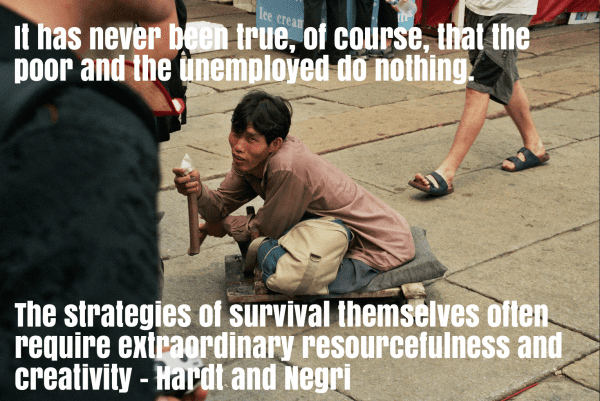Toward the end of Willis Jenkins’ book, The Future of Ethics, he has a gem of a discussion about poverty. What do we do about widespread impoverishment? How should “rich Christians in an age of hunger” respond?
His answer might surprise you.

What won’t surprise you is that, contrary to the advocates of unbridled global neo-capitalism, Jenkins’ does not agree that the answer to poverty is to create more total wealth. We cannot simply keep on growing the economy and expect that the total growth is going to “trickle down” to the poorest of the poor. Increasing the total wealth, much less that at the top, will not provide a solution for for the world’s poor.
This is because poverty is not simply about economics pure and simple. You can’t just put more wealth into the system and assume it will make its way to everyone eventually–if everyone just “does their part,” by wanting it enough and working hard enough.
Rather, poverty is about relations: economic relations, yes, but also political and social relations. So while increasing the total economic wealth will help some, perhaps even many, it does not help everyone.
Jenkins notes that the total world economy has grown since 2005. But extreme poverty (measured by those making less than the equivalent of $1.25/day) has decreased, “both in real numbers (500 million less than in 1980) and as a percentage of the population (down from nearly half the population only 25 years ago)” (p. 235).
However, this economic growth is not simply equated to decreasing poverty levels, without complications. It’s not a strict one-to-one correspondence. Jenkins notes that the economic growth since 2005 has been “regionally concentrated,” and the declining poverty rates have come particularly from China’s development. Other areas of the world, however, including sub-Saharan Africa, remain mired in steep poverty rates (“over 50% in many nations.”).
Furthermore, in our global economy, while economic growth can and does lift some out of poverty, it has the opposite effect for others:
Globalization of growth, Paul Collier has shown, does little to help the poorest billion persons, whose economic exclusion is often worsened by globalization dynamics. The wealthy are benefiting by sustaining structures of impoverishment. (236).
But there’s another reason we can’t assume that growing the global economy will have a simple effect of lifting people out of poverty. Poverty, as a definition, is determined not just by the availability of money (income) but by “political and social condition,” which determine how that income can be used–whether or not that income will have the effect of providing people a life with access to basic necessities.
So the question for us, on a global scale, is not just how we can grow the total economy, but how we can address the various levels of relations that create the conditions of social life that will either perpetuate or alleviate poverty. The challenge, Jenkins says, is to work out “creative and persistent attempts to make economic relations work to overcome impoverishment” (239).
An approach that emphasizes either individual charity and community benevolence is insufficient, because such efforts alone cannot possibly address the deep-rooted systemic problems. However, this doesn’t mean charity and benevolence should be discarded, because for one thing they are important means by which those who give are reminded they are participants in a larger system of economic and spiritual relationships (and that they are responsible to and accountable for others within that system).
On the other side, an approach which merely critiques the ills of global capitalism and free market economies, however prophetic those critics might be, is also inadequate in rectifying extreme poverty. Here Jenkins notes the tendency of some Christian socialists and liberation theologians to critique the economic system of capitalism without realizing that sometimes market economies prove fruitful in decreasing poverty levels and raising people out of extreme poverty. It does not help to simply bash capitalism as if it were a single, monolithic entity with only a single result. Jenkins is worth quoting at length here:
However, Christian ethics sometimes focuses so intently on prophetic critique that it obscures the historic success of markets in creating income growth that has been important, even if not determinative, for reducing poverty. Some Christian social thought of recent decades uses existing poverty to leverage its denunciation of market globalization, ignoring the role that markets have played in reducing impoverishment. Absolute and relative rates of poverty have declined as more people participated in the global market. The decline was not nearly as much as wealth would allow, and market globalization continues to harm and entrap many people. Neither a salvific process nor the beast of Babylon, the market is an ambivalent institution. It generates wealth and it also impoverishes (239).
So the answer, for Jenkins, seems note to reside in any of the promoted options out there: either a free-market “let’s generate all the wealth we can and watch it trickle up” approach, or a individual charity approach, or an economic development approach, or a wholesale replacement of capitalist, free-market economies with something else.
Jenkins challenges us to approach the problem, from the perspective of Christian ethics, with this question: “How can markets be used to create real wealth for the poor and where do current market arrangements produce impoverishment?”(239).
For more discussions and posts on theology and society, like Unsystematic Theology on Facebook















